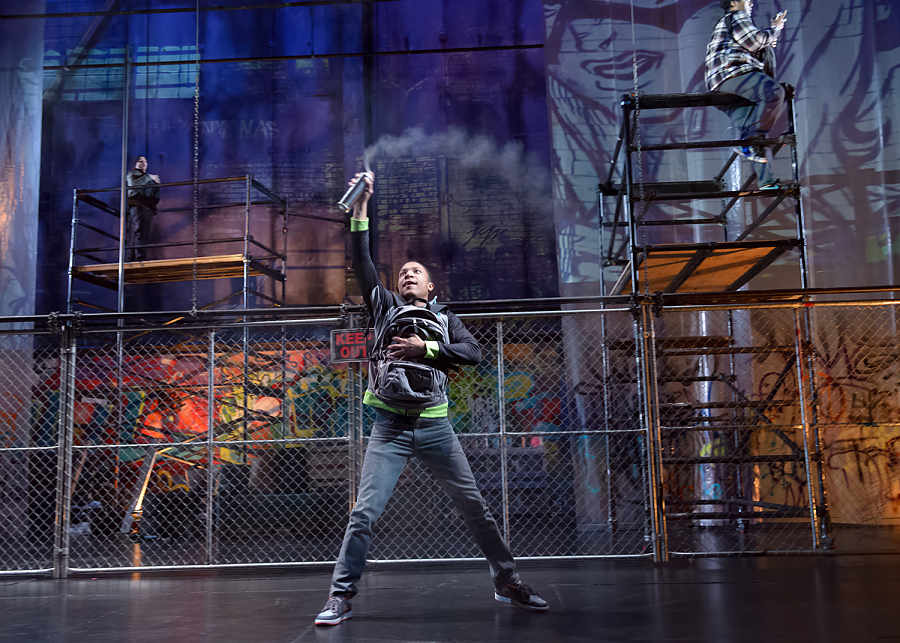Attention, journalists who are currently writing about theatre. We need to have a talk. I know we don’t all get together very often, mostly because if we ever leave our offices, our corporate overlords will assume we’re dead and fill our empty spaces before our desk chairs are even cold. But lately, there has been some racial insensitivity among the members of our increasingly small rank. And it has got to stop.
Last month, Jeffrey Gantz of the Boston Globe wondered—in his review of A. Rey Pamatmat’s Edith Can Shoot Things and Hit Them—why the Filipino-American characters weren’t very, well, Filipino. He wrote: “I wish more of their culture were on display, and it seems odd that they have no racial problems at school.” The play was about two Filipino-American orphans navigating adolescence, and one of them is packing heat. Their ethnicity is not the point of the show, and to assume it should be is tantamount to wondering why the character of Jamie in Jason Robert Brown’s The Last Five Years never mentions the Holocaust. He is, after all, Jewish.
It’s not just critics. Reporters are also guilty. Pamatmat wrote on his website that, “In the weeks before the review came out, almost every journalist in Boston that spoke with me asked some version of the question, ‘Why are your characters Filipino(-American)?’” and “When critics don’t like my plays, they will often say something racist in the review.”
Guys, we are living in 2015. To paraphrase Mean Girls, you can’t just ask people why they’re Filipino. Sadly, this is not the first time this year that our colleagues have stuck their foot into their mouths when talking about race (remember the This is Modern Art controversy in Chicago?).

We theatre journalists are a marginalized minority ourselves: overworked, underpaid, and constantly fighting to justify our existence. We’re not all that different from the artists we claim to love. And if we really love theatre, then we need to find a better way to talk about the diverse people who make it. Because right now, we—whose job it is to tell the truth—are failing at it.
Have no fear. With the handy list below, you can learn how to properly acknowledge the artists and characters of color in the room.
-
Don’t ask the playwright of color questions that you would not ask a white playwright. If you’re going to ask a Filipino playwright, “Why are your characters Filipino?” be prepared to ask Samuel Hunter why all of his characters are white. A good litmus test: Would I be saying the equivalent of this if the playwright/character they created were white? If not, then don’t say it. In short, don’t make plays that are not about race about race just because the faces on the stage are non-white.
-
Avoid stereotypical adjectives when describing different ethnicities. For example, “sassy” for black women, “Tiger mom” for Asian women, “fiery” for Latina women. Rule of thumb: Think of the words you might use in a racial association test, then pick something else. The thesaurus can be your friend. Avoid hyperbole. When Hedy Weiss reviewed This is Modern Art by Idris Goodwin and Kevin Coval, she called the young black men who were engaging in graffiti “urban terrorists.” Want to know what’s a terrorist? A young white man mass-murdering black churchgoers. A graffiti artist? Not so much.
-
Call out problematic representations when you see them. When Jessie Mueller is prancing around in bronze makeup in Drood, playing a music hall actor pretending to be Sri Lankan, and that seems like it might (kinda sorta) be offensive, say it. Don’t make one quick reference to it in your review (or no reference at all) and assume people won’t notice it. We are not here to uphold the status quo, where theatres can get away with blatant racial stereotyping and no one bats an eye. Everyone is a little bit racist, sure—and we should call it out. Be an ally.
-
Own your mistakes. We all come with unconscious biases and sometimes we stick our pens in our mouths. The best thing to do when we unintentionally write something offensive is to not be defensive. Acknowledge it, have a conversation about it, do not be dismissive, and try to be do better next time. Racism is the institution; it is built into the brick and mortar of our culture, and it affects the way we view the world, whether we want it to or not. So next time something you write something deemed racially offensive, do not say the words “politically correct” or “I’m sorry you feel that way” or that the feelings of minority populations are, in the words Christopher Ehlers of digBoston, “misguided and unreasonable.” Defending your remarks doesn’t make you noble. It makes you part of the problem.
And if you can’t remember any of these rules, at least remember this one: Don’t say anything that John Simon would have said.


